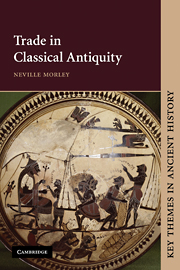4 - Institutions and infrastructure
Published online by Cambridge University Press: 23 December 2009
Summary
The Carthaginians inform us that they trade with a race of men who live in an area of Libya lying beyond the Pillars of Heracles. When they arrive at this country, they unload their merchandise, arrange it in an orderly manner on the beach and then, returning to their ships, light a fire. When they see the smoke, the natives come down to the beach, place on the ground a quantity of gold in exchange for the goods and retire once more to a distance. The Carthaginians come ashore and consider the gold; if they think it represents a suitable return for their goods, they gather it up and depart; if, on the other hand, it seems to them to be too little, they go back aboard and wait, and the natives come and add more gold until the Carthaginians are satisfied. There is perfect honesty on both sides; the Carthaginians never touch the gold until it equals in value what they have for sale, and the natives never touch the merchandise until the gold has been taken away.
(Hdt. 4.196)We must keep any form of misrepresentation entirely out of business transactions: the seller will not hire a bogus bidder to run prices up, and the buyer will not hire anyone to bid low against himself in order to keep them down; and each of them, when they come to naming a price, will state once and for all what they are prepared to give or take.
(Cic. Off. 3.61)- Type
- Chapter
- Information
- Trade in Classical Antiquity , pp. 55 - 78Publisher: Cambridge University PressPrint publication year: 2007



